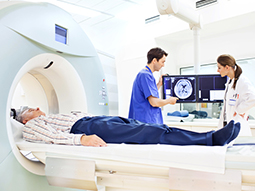An ultrasound, also called a sonogram, uses sound waves to produce pictures of the body. Ultrasounds do not involve radiation and are usually painless. Doppler ultrasound can follow blood flow in major arteries and veins in the abdomen, arms, legs, and neck. Ultrasound is also used to help doctors during some procedures.
Areas of the body are scanned in real time so the images can show the structure and movement of the body's organs, as well as blood flow in the vessels. During an ultrasound, when the sound waves reach an object, they bounce backward or echoe. By measuring the echo wave, it is possible to determine the size, shape, and consistency of the object being studied.
Transthoracic echocardiogram
A transthoracic echocardiogram, or TTE, is the most common type of echocardiogram. We may order a TTE if you have:
-
Abnormal heart sounds
-
Enlarged heart
-
Chest pain
-
Shortness of breath
-
Irregular heartbeat
TTE is also used to examine your heart valves, check on the function of an artificial heart, and determine how well your heart can pump blood.
Transesophageal echocardiogram
MedStar Health doctors may use a transesophageal echocardiogram, or TEE, to examine the size and shape of your heart, as well as how well your heart chambers and valves are working. TEE is useful for:
-
Detecting blood clots and abnormal masses
-
Determining the severity of heart valve problems
-
Detecting certain heart diseases
-
Evaluating patients who have suffered a stroke due to a blood clot
Stress echocardiogram
A stress echocardiogram is useful in determining whether your heart muscle has sufficient blood flow and oxygen when it is under stress. If you have chest pain or recently had a heart attack, your doctor may order a stress echocardiogram. The results of the test can help your doctor determine how well your heart pumps and if there is a sign of coronary artery disease.
To determine if you have a blockage near your heart, your doctor may recommend intravascular ultrasound (IVUS). IVUS allows MedStar Health doctors to see images inside of blood vessels and arteries. A tool reflects sound waves off tissue and vessel walls to show heart blockages or other heart abnormalities.
IVUS is useful for:
-
Revealing the composition of the underlying plaque, (to help determine which type of angioplasty might work best)
-
Measuring the speed of the blood flow within a coronary artery is a way to determine if a blockage is severe enough to deprive the heart muscle of its blood flow
-
Immediately understanding if an angioplasty was successful before physicians remove the catheters
Our providers










